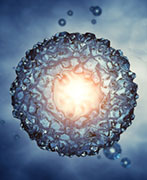- Could Your Grocery Store Meat Be Causing Recurring UTIs?
- Are You Making This Expensive Thermostat Error This Winter?
- Recognizing the Signs of Hypothyroidism
- 10 Strategies to Overcome Insomnia
- Could Artificial Sweeteners Be Aging the Brain Faster?
- Techniques for Soothing Your Nervous System
- Does the Water in Your House Smell Funny? Here’s Why
- Can a Daily Dose of Apple Cider Vinegar Actually Aid Weight Loss?
- 6 Health Beverages That Can Actually Spike Your Blood Sugar
- Treatment Options for Social Anxiety Disorder
Mom’s Weight Might Influence Baby’s Earliest Development


A mother’s weight before pregnancy may affect her embryo’s early development and possibly the long-term health of the child, a new study suggests.
“Previous studies have indicated that a mother’s weight at conception is associated with increased risk of cardiovascular and metabolic diseases in the children later in life,” Dr. Roger Sturmey, from the Center for Cardiovascular and Metabolic Research at the University of Hull in England, said in a university news release.
“What we have found here is that being overweight at conception does appear to result in changes to the embryo at a very early stage, and that these changes are most likely the result of the conditions in the ovary in which the egg matured,” he said.
“These changes may reduce the chances of conception for overweight women, and may even have long-term health implications for the children of overweight and obese women,” Sturmey added.
However, the study was only able to find an association between a mother’s weight and the development of embryos. It wasn’t designed to prove that a woman’s weight actually caused the changes seen. In addition, Sturmey noted that the study was small, and more research needs to be done to confirm the link.
The new study looked at more than 350 fertilized eggs from 58 women undergoing fertility treatment and found that being overweight or obese at the time of conception had a number of negative effects.
Eggs from overweight and obese women were much smaller in diameter than eggs from women with a healthy weight. And these smaller eggs were less likely to reach a crucial stage of development called the blastocyst, which occurs at about five days after fertilization.
Embryos from overweight and obese women that reached the blastocyst stage did so an average of 17 hours faster than those from women with a healthy weight. This faster early development means that these blastocysts contained fewer cells, most notably in the outermost layer, which goes on to form a large part of the placenta, the researchers said.
The researchers also found considerable alterations in the chemistry of the embryos of overweight and obese women. These alterations included significantly reduced intake of glucose — an important energy source for early stage embryos — and significantly increased levels of triglyceride fats.
Also, embryos from overweight and obese women had altered metabolism of some amino acids, which are the building blocks of cells, muscle and tissue, the researchers said.
The study was published Nov. 12 in the journal Human Reproduction.
Sturmey said the findings highlight another potential reason why it’s important for women to have a healthy weight before becoming pregnant.
More information
The U.S. Office of Disease Prevention and Health Promotion offers tips for a healthy pregnancy.
Source: HealthDay
Copyright © 2026 HealthDay. All rights reserved.










